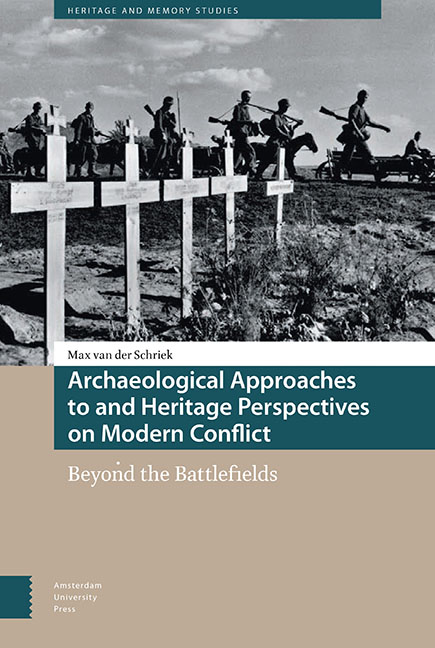Book contents
- Frontmatter
- Dedication
- Contents
- List of figures
- Acknowledgements
- 1 Introduction
- 2 Conflict archaeology
- 3 Landscape biographies of commemoration
- 4 Status quaestionis of conflict archaeology
- 5 Scientific and societal importance
- 6 The application of LiDAR-based DEMs
- 7 Summary and final debate
- Synopsis
- Appendix: WWII-related archaeological researches in the Netherlands (1984-2017)
- Bibliography
- Index
2 - Conflict archaeology
Published online by Cambridge University Press: 27 April 2022
- Frontmatter
- Dedication
- Contents
- List of figures
- Acknowledgements
- 1 Introduction
- 2 Conflict archaeology
- 3 Landscape biographies of commemoration
- 4 Status quaestionis of conflict archaeology
- 5 Scientific and societal importance
- 6 The application of LiDAR-based DEMs
- 7 Summary and final debate
- Synopsis
- Appendix: WWII-related archaeological researches in the Netherlands (1984-2017)
- Bibliography
- Index
Summary
Abstract
This chapter delves into the historical roots and theoretical background of conflict archaeology, outlining the three main categories of conflict: prehistoric, historic and modern. Conflict archaeology is geographically divided and, in the case of historic and modern conflict, has a strong nation-specific character. Research on prehistoric conflict often has a social-anthropological character and focuses on the nature of warfare. Historic conflict investigations usually take a more nation-specific perspective. Such sites of conflict are often identified and researched on the bases of historical data. In studies conducted abroad, historic terrain reconstruction and metal detector surveys turned out to be the most promising methods for modern conflict research, indicative of its status as a new field.
Keywords: methods, techniques, prehistoric conflict, historic conflict, modern conflict
Historical background
Outside the Netherlands, conflict archaeology has grown at an exceptional rate and can be roughly subdivided into three main categories: prehistoric, historic and modern conflict. Archaeological research can therefore be applied to both ancient conflicts, such as the Battle of Thermopylae (480 BC), and to modern conflict sites, such as the Korean War (1950-1953). What exactly to call conflict archaeology is still a subject of debate. When this distinct branch of archaeology was first practised officially in the 1980s, it was defined as battlefield archaeology. Another common term is combat archaeology, which is restricted to immediate face-to-face combat and not warfare or warlike behaviour over the long term. Both terms, however, are too limited.
The term battlefield archaeology is widely used in the Netherlands, and, misleadingly, it is also used for sites connected to conflict that are not battlefields per se, such as former concentration camps. Battlefield archaeology generally focuses on the archaeology of an event, such as a battle, rather than the field on which it took place, as the term implies. Furthermore, the origins of conflict are of greater importance to battlefield archaeologists than military strategy. Conflict archaeology is a more inclusive term, which includes internment camps, concentration camps and prisoner-of-war camps, among other non-battlefield topics, and will therefore be used in this study when referring to sites of conflict. However, a more fully refined archaeological vocabulary still has to be defined.
- Type
- Chapter
- Information
- Archaeological Approaches to and Heritage Perspectives on Modern ConflictBeyond the Battlefields, pp. 37 - 78Publisher: Amsterdam University PressPrint publication year: 2022



